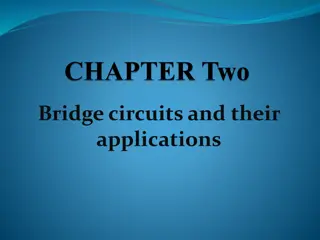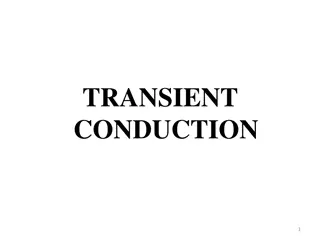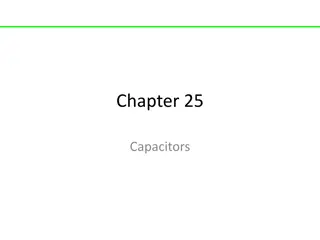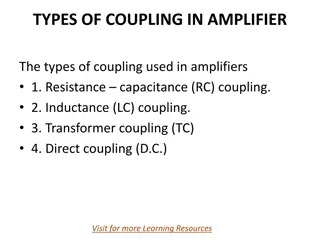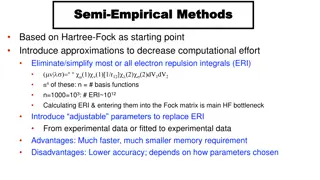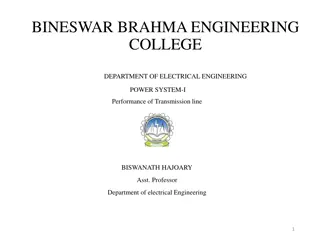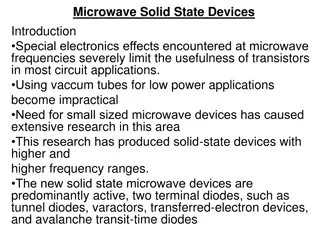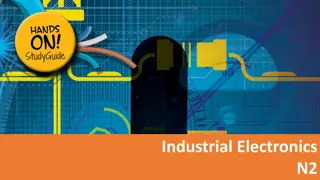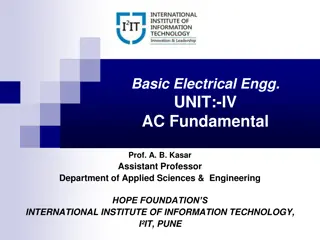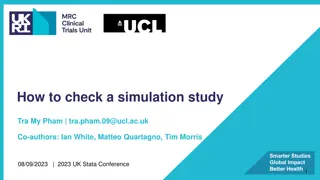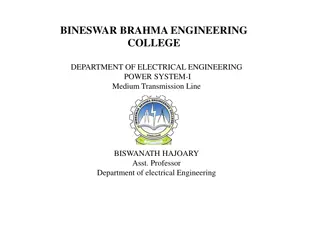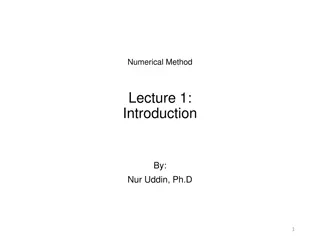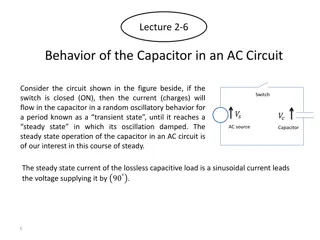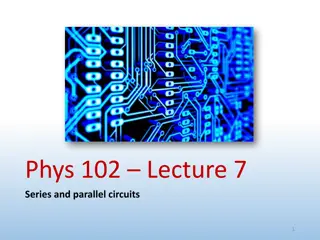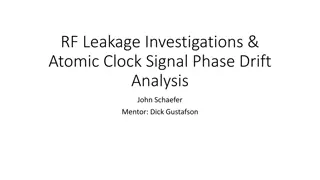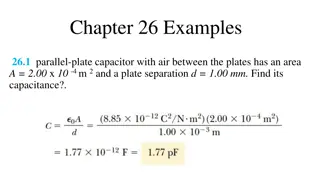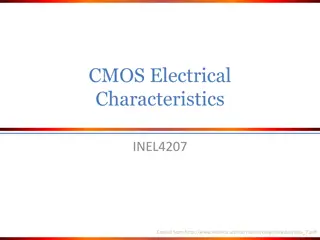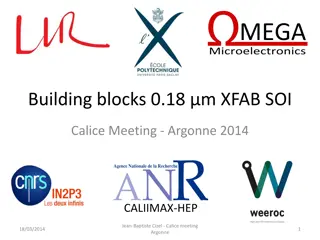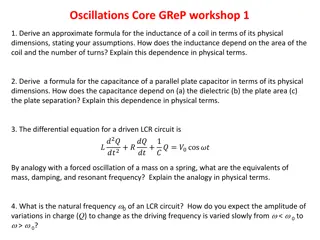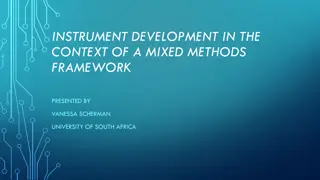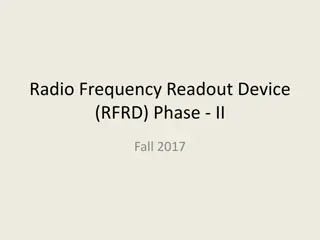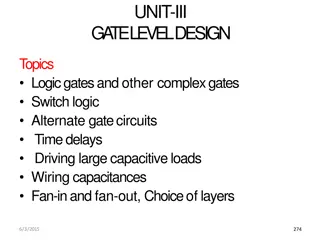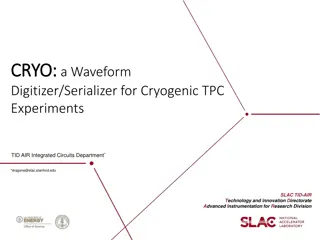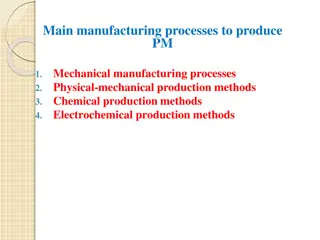Comprehensive Guide to Contraception and Birth Control Methods
Safe sex practices are crucial for preventing unplanned pregnancies and sexually transmitted infections (STIs). This guide discusses various contraception methods including barrier methods like male and female condoms, hormonal contraceptives such as oral pills, and their effectiveness rates. Cost,
0 views • 23 slides
Bridge circuits and their applications
Bridge circuits are commonly used for precision measurement of component values such as resistance, inductance, and capacitance. The Wheatstone bridge, a type of bridge circuit, is particularly useful for measuring small changes in resistance, making it ideal for sensor applications. By comparing un
1 views • 16 slides
Extension Teaching Methods
Extension teaching methods play a crucial role in facilitating communication and knowledge transfer between rural communities and extension workers. These methods aim to engage, stimulate, and guide learners through the process of acquiring new skills and knowledge. Centurion University in India emp
4 views • 8 slides
Understanding Veal: Types, Characteristics, Grading, and Cooking Methods
Veal is a tender meat sourced from young calves aged 6-7 months. It has a light color, fine texture, and smooth taste. Learn about different types of veal such as Bob Veal and Special-Fed Veal, as well as the grading system for veal carcasses. Discover the various cuts of veal and explore recommende
1 views • 9 slides
Understanding Transient Conduction in Heat Transfer
Transient conduction in heat transfer occurs when boundary temperatures change, causing temperature variations within a system until a steady state is achieved. This phenomenon is commonly seen in processes like quenching hot metals. The Lumped Capacitance Method is used to analyze such scenarios, i
0 views • 55 slides
Understanding Heat Transfer and Cooking Methods
Explore the various methods of heat transfer and cooking techniques, including moist-heat and dry-heat methods. Learn about the objectives of heating foods, types of heat transfer such as conduction and convection, and how different methods affect the texture, flavor, and nutritional content of food
0 views • 21 slides
Comprehensive Guide to Natural Family Planning Methods
Family planning methods offer individuals control over their fertility through various contraception options, including natural methods like Basal Body Temperature (BBT), Rhythm method, Cervical Mucus/Ovulation method, and Sympto-thermal method. These techniques help in determining the fertile windo
5 views • 39 slides
Understanding Capacitors in Physics
Capacitors are electronic components that can store electric charge and energy. This content covers various concepts related to capacitors, such as capacitance, charge storage capacity, electric fields between plates, and capacitance calculations for different geometries. Problems and examples are p
1 views • 46 slides
Amplifier Coupling Techniques and Applications
Amplifiers utilize various coupling techniques such as resistance-capacitance (RC), inductance (LC), transformer, and direct coupling to connect different stages. Each coupling method has its advantages and applications, such as impedance matching, power transfer, and amplification of radio frequenc
2 views • 16 slides
Overview of Semi-Empirical Methods Based on Hartree-Fock
Semi-empirical methods derived from Hartree-Fock theory aim to reduce computational effort by approximating or eliminating electron repulsion integrals. Strategies include introducing adjustable parameters to replace ERI calculations and utilizing zero differential overlap methods like CNDO, INDO, N
1 views • 11 slides
Understanding Performance of Transmission Lines in Electrical Engineering
The performance of a transmission line in power systems is critical for efficient operation. Factors such as voltage drop, line losses, and transmission efficiency are key considerations in design and operation. The line parameters of resistance, inductance, capacitance, and shunt conductance play c
2 views • 26 slides
Understanding Varactor Diodes in Microwave Solid-State Devices
Varactor diodes, also known as varicap diodes, play a crucial role in microwave solid-state devices by offering a much higher range of capacitance change compared to ordinary diodes. These diodes operate under reverse bias conditions, utilizing the variable capacitance effect to manipulate the junct
1 views • 48 slides
Understanding Electrical Principles in Industrial Electronics
Explore the fundamentals of industrial electronics, starting with direct current principles related to atomic theory, conductors, insulators, and resistors in series and parallel. Then, delve into alternating current principles, including generating an alternating voltage, alternating current (AC) b
0 views • 46 slides
Understanding AC Fundamentals in Basic Electrical Engineering
Exploring key concepts in AC fundamentals, including definitions of alternating quantities, important terms like amplitude, time period, instantaneous value, frequency, and angular frequency. The presentation covers AC circuits with resistance, inductance, and capacitance, providing insights into RM
0 views • 25 slides
How to Check a Simulation Study: Methods and Considerations
Simulation studies are often used to evaluate statistical methods and study power, but they can sometimes produce misleading results. This work discusses strategies to assess and improve the quality of simulation studies, drawing on experiences and considerations outlined in relevant literature. A s
0 views • 31 slides
Understanding Contraception: Methods, Importance, and Considerations
Contraception refers to methods used to prevent unwanted pregnancies, regulate pregnancy timing, and spacing between pregnancies. It is essential for women's reproductive health and can include barrier methods, hormonal methods, emergency contraception, and intrauterine devices. These methods are sa
3 views • 28 slides
Understanding Sentiment Classification Methods
Sentiment classification can be done through supervised or unsupervised methods. Unsupervised methods utilize lexical resources and heuristics, while supervised methods rely on labeled examples for training. VADER is a popular tool for sentiment analysis using curated lexicons and rules. The classif
7 views • 17 slides
Understanding Medium Transmission Line Capacitance Methods
Medium transmission lines, with lengths typically between 50-150 km and operating at voltages greater than 20 kV, require consideration of capacitance effects for accurate calculations. This article discusses key capacitance methods like the End Condenser Method and Nominal T Method, highlighting th
3 views • 22 slides
Introduction to Numerical Methods: A Comprehensive Overview
Numerical methods play a crucial role in solving mathematical problems efficiently through arithmetic operations. This lecture by Dr. Nur Uddin covers the fundamental concepts of numerical methods, emphasizing their importance in engineering problem-solving with the use of modern digital computers.
1 views • 17 slides
Understanding Methods of Social Work
Methods of social work encompass various approaches aimed at enhancing social functioning and addressing problems in individuals and communities. These methods are categorized into primary and secondary methods, each serving different purposes in the field. Primary methods involve direct interaction
0 views • 20 slides
Understanding Capacitor Behavior in AC Circuits
Capacitors exhibit unique behaviors in AC circuits, transitioning from transient to steady states. By analyzing the interaction between source voltage and capacitance, we can derive key relationships such as phase differences and power transfers. Understanding these principles is essential for desig
0 views • 16 slides
Understanding Moving Averages and Exponential Smoothing Methods
Forecasting methods like moving averages and exponential smoothing are essential for analyzing time series data. Averaging methods involve equally weighted observations, while exponential smoothing methods assign unequal weights that decay exponentially. Both methods can be useful for forecasting in
0 views • 18 slides
Types of Birth Control Methods and Their Effectiveness
Explore the different types of birth control available, including abstinence, hormonal methods, barrier methods, and permanent methods. Learn about the effectiveness rates, how they work, and their pros and cons to make an informed decision about contraception. From hormonal options like pills, patc
0 views • 23 slides
Electric Circuits: Series and Parallel Configurations Explained
In this lecture on electric circuits, we delve into series and parallel circuits featuring batteries, wires, resistors, and capacitors. Key concepts discussed include Kirchhoff's loop rule, series components, and equivalent resistance and capacitance. Learn how to simplify complex circuits and analy
0 views • 24 slides
RF Leakage Investigations & Atomic Clock Signal Phase Drift Analysis
RF signals ranging from 100 kHz to 150 MHz are utilized for achieving resonance in optical cavities. DC Ground Isolation Units help decouple DC grounds and shield leakage. Spectrum analysis using RF analyzers reveals peaks possibly from neighboring balun leakages. Solutions involve increasing capaci
0 views • 14 slides
Capacitor Problems and Solutions
Explore a series of capacitor-related problems, including calculating charge, radius, capacitance, electric field, and more. Dive into scenarios involving capacitors connected to batteries, liquid drops with capacitance, Earth and cloud layers as capacitor plates, air-filled capacitors, surface char
0 views • 18 slides
Solving Systems of Equations: New Methods and Applications
The content discusses various methods for solving systems of equations, including substitution and elimination methods. It presents real-world problems involving money, sales figures, and fishing competitions to demonstrate the application of these methods. Readers will learn how to apply these tech
0 views • 10 slides
Understanding Capacitors in Electric Circuits
Exploring various scenarios involving capacitors in electric circuits, from analyzing the electric field between capacitor plates to determining stored energy and capacitance differences. Topics covered include equilibrium charge distribution, potential energy comparison, and stability of interconne
0 views • 7 slides
Capacitors: Examples and Applications
Explore examples of parallel-plate capacitors with varying dimensions and configurations, calculating capacitance, maximum charge, and energy storage. Understand how capacitors behave in circuits and how to determine equivalent capacitance in complex setups.
0 views • 9 slides
Procedural Decomposition and Static Methods in Programming
Understanding procedural decomposition and static methods is essential in programming to reduce redundancy, organize code effectively, and manage complexity. Procedural decomposition involves dividing a problem into methods, while static methods help in code reuse and managing complexity. By designi
0 views • 18 slides
Understanding Timing Models in Cell Design Environments
Delve into the intricacies of timing models for cells in design environments, exploring factors affecting delay, output transitions, linear and non-linear models, and the use of table models in cell libraries to specify delays and timing checks. Discover how input transitions and output capacitance
0 views • 11 slides
Understanding CMOS Electrical Characteristics for INEL4207
This document delves into the electrical characteristics of CMOS technology, covering topics such as power-delay product, latch-up, hot carriers, electromigration, sheet resistance, and parasitic capacitance. It provides valuable insights into the performance and behavior of CMOS circuits.
0 views • 13 slides
Comprehensive Study on XFAB SOI Technology for Digital Electronics
Analog building blocks using XFAB SOI technology with adjustable feedback capacitors, slow and fast shapers, simulation results, linearity up to 8.36 pC, discriminator efficiency, and Monte Carlo analysis. Issues regarding noise contributions and feedback capacitance are also discussed. Presented at
0 views • 13 slides
Understanding Inductance and Capacitance in Electric Circuits
Explore the derivation of inductance and capacitance formulas in terms of physical dimensions and learn about the dependencies on coil area, number of turns, dielectric, plate area, and plate separation. Understand how inductance relates to magnetic flux and coils while capacitance is linked to char
0 views • 16 slides
Instrument Development in Mixed Methods Framework by Vanessa Scherman
Mixed methods research presented by Vanessa Scherman from the University of South Africa explores the development of instruments within a mixed methods framework. The content covers an overview of mixed methods, methodological norms, instrumental development, and closing the loop. It discusses the i
0 views • 40 slides
Radio Frequency Readout Device (RFRD) for Tightness Measurement of Anchor Bolts
The Radio Frequency Readout Device (RFRD) Phase II project aims to reduce the time needed to check the tightness of nuts on anchor bolts. By utilizing a passive RFRD that measures capacitance changes in washers, the system offers a wireless, cost-effective solution for monitoring nut tightness. With
0 views • 27 slides
Understanding Logic Gates and Large Load Driving in GA-TE Level Design
In GA-TE Level Design, the topics cover logic gates, complex gates, switch logic, gate circuits, timedelays, driving capacitive loads, wiring capacitances, fan-in and fan-out, choice of layers, NMOS and PMOS gate constructions, parasitics and performance impact, strategies for driving large loads, a
1 views • 21 slides
SLAC CRYO: Waveform Digitizer/Serializer for Cryogenic TPC Experiments
SLAC is developing the CRYO ASIC, a high-performance waveform digitizer and serializer optimized for cryogenic operation in experiments like DUNE. The CRYO ASIC offers advanced features such as single-chip integration, programmability, on-chip regulation, and design for reliability. Operating in a 1
0 views • 23 slides
Advanced Imaging Techniques for Three-Phase Flows in Reactor Systems
Gas-liquid-solid reactor systems require advanced measuring techniques to understand complex three-phase flows. Multi-Phase Flow Decomposition using Electrical Capacitance Volume Tomography (ECVT) offers innovative solutions for visualizing and quantifying phase hold-up distributions and dynamic cha
0 views • 17 slides
Main Manufacturing Processes to Produce PM - Mechanical, Chemical, Electrochemical
The process of producing PM involves various manufacturing processes such as mechanical grinding and milling, physical-mechanical production methods, chemical production methods, and electrochemical production methods. Mechanical processes include grinding and milling using jaw crushers, hammer grin
0 views • 12 slides

